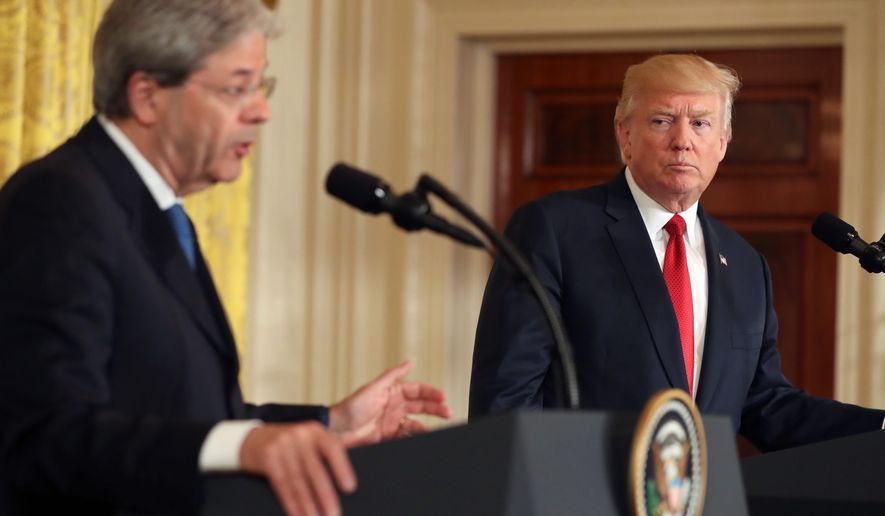President Trump didn’t sugar-coat it Thursday when contradicting Italian Prime Minister Paolo Gentiloni’s argument that the U.S. should play a “very critical role” in stabilizing Libya after the defeat of the Islamic State there.
“I don’t see a role in Libya,” Mr. Trump flatly responded at joint press conference at the White House, following the two leader’s first face-to-face meeting.
Mr. Trump also promised to pressure Mr. Gentiloni about fulfilling Italy’s commitment to pay 2 percent of its gross domestic product (GDP) to NATO. Italy pays about 1 percent.
That’s a pet peeve for Mr. Trump. He repeatedly has said that NATO members don’t pay their fair share and the U.S. pays too much for military defense in Europe.
Mr. Trump reacted with glee when a reporter asked Mr. Gentiloni about the NATO payments.
“I love the question you asked the prime minister. I look forward to his answer,” Mr. Trump said to laughter from the audience. “Because I’m going to be asking him that same question very soon.”
Despite the disagreements, both leaders vouched for the solid friendship and close alliance between America and Italy, which Mr. Trump called “bonds of history and culture.” They vowed to work together to fight terrorism and strengthen economic ties.
Security issues dominated the meeting between the two leaders. At the press conference, they touched upon a hotspots around the globe, including Iran and North Korea.
Mr. Trump warned that Iran was not living up to the “spirit” of the nuclear deal it signed with the U.S. and other world powers during the Obama administration.
“Iran has not lived up to the spirit of the agreement, and they have to do that,” he said. “They are doing a tremendous disservice to an agreement that was signed.”
Secretary of State Rex Tillerson accused Iran this week of destabilizing the world, and said the administration is reviewing the Obama administration’s decision to lift economic sanctions against Tehran. However, the Trump administration also certified that Iran is complying with the deal to abate its nuclear program.
Mr. Trump called it “as bad as I’ve ever seen negotiated.”
In response to a reporter’s question about whether North Korean leader Kim Jong-un is mentally stable, the president said he hopes “the answer is a positive one.”
The president boasted that the U.S. is rapidly beefing up its military, but he looked to China to step up to the North Korea problem.
Mr. Trump said he is confident he has persuaded China, following his meeting this month with Chinese President Xi Jinping, to try to rein in North Korea, which has nuclear weapons and is working on missiles that could reach the U.S.
“I have absolute confidence that he will be trying very, very hard,” said the president. “I actually told him, I said, ’You’ll make a much better deal on trade if you get rid of this menace or do something about the menace of North Korea.’ Because that’s what it is, it’s a menace right now.”
The disconnect on Libya and NATO funding highlighted the uncertainties that could cloud Mr. Trump’s first trip abroad next month. He’ll attend a NATO meeting in Brussels and the Group of Seven industrialized nations summit that Mr. Gentiloni will host in Taormina, Sicily.
European leaders have complained about mixed messages sent by Mr. Trump, such as labeling NATO “obsolete” only to later declare that it “isn’t obsolete anymore.”
On the question of helping forge a political solution in Libya, Mr. Trump said the has “too many roles right now.”
The answer revived the isolationist rhetoric from the Trump campaign that recently appeared to evaporate amid U.S. airstrikes on Syria and Navy warships steaming toward the Korean Peninsula.
“We are effectively ridding the world of ISIS,” said Mr. Trump. “I see that as a primary role, and that’s what we’re going to do, whether it’s in Iraq or in Libya or anywhere else. And that role will come to an end at a certain point. And we’ll be able to go back home and rebuild our country, which is what I want to do.”
Libya is a top concern for Italy, which is the destination for thousands of Libyan refugees fleeing across the Mediterranean Sea. For Rome, repairing the failed state in Libya must go hand in hand with the defeat of the terrorists.
“A divided country and in conflict would make civility worse. The U.S. role in this is very critical,” said Mr. Gentiloni.
On NATO payments, he said Italy is “proud” of its contribution of both money and troops to military operations.
“We know that Italy has certain limitations when it comes to its budget. But despite these limitations, our commitment for common defense is very clear,” he said, noting Italy’s involvement in the wars in Iraq and Afghanistan.
“We talked about Iraq and Afghanistan, but we could also talk about the Baltic Sea or the Balkans,” said Mr. Gentiloni. “In all of these areas, you will see the presence of Italian forces within the alliance. And we are proud of that.”
• Dave Boyer can be reached at dboyer@washingtontimes.com.
• S.A. Miller can be reached at smiller@washingtontimes.com.




Please read our comment policy before commenting.